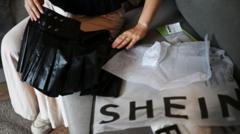The EU has identified various unlawful practices by Shein, including fake discounts and misleading product information. The company must respond to these findings within one month to avoid potential fines.
EU Takes Action Against Shein for Misleading Practices in Online Sales

EU Takes Action Against Shein for Misleading Practices in Online Sales
The European Union has raised concerns over Shein's deceptive sales tactics that violate consumer protection laws, granting the fast-fashion retailer a month to reform its practices.
Article Text:
The European Union (EU) has taken a firm stance against Shein, highlighting that the popular Chinese fast-fashion retailer is engaging in practices that breach consumer protection laws. The EU’s allegations include fake discounts, pressure selling, and several misleading tactics that may deceive consumers.
In a recent statement, EU Justice Commissioner Michael McGrath emphasized, "It's now for Shein to step up, respect the rules, and align its practices fully with EU consumer standards." The enforcement action gives Shein a one-month window to respond to the EU’s findings; failure to comply could result in significant fines contingent upon the company’s sales within EU member states.
The EU's investigation has unveiled a troubling array of practices that consumers encounter while shopping on Shein’s platform. These include misleading pricing strategies, deceptive product labels, unfounded sustainability claims, and obscured contact information. Pulsating pressure tactics were also noted, where consumers were led to believe they were securing better deals through fabricated price cuts and artificial deadlines.
The EU’s directive also requires Shein to ensure that the presentation of product reviews and ratings is transparent and not misleading to consumers. "All companies reaching out to EU consumers must play by our rules," declared McGrath. He assured that the EU would not hesitate to hold e-commerce platforms accountable, regardless of their origin.
In response to the EU scrutiny, a Shein spokesperson reaffirmed the company's commitment to providing a safe, reliable online shopping experience for European customers. The spokesperson indicated an effort to collaborate with national consumer authorities and the EU Commission to address compliance concerns.
This is not the first time Shein has faced criticism; recent reports revealed horrific labor practices wherein employees were clocking in over 75 hours a week, violating prevailing labor laws in China. Furthermore, the retailer faced accusations in the UK for dodging inquiries regarding its cotton sourcing, raising concerns about ethical transparency.
In reaction to criticisms regarding labor conditions, Shein stated it is "committed to ensuring the fair and dignified treatment" of all workers in its supply chain and is investing substantial resources in enhancing governance and compliance measures. The company claims to uphold high pay standards and mandates adherence to its code of conduct among supply chain partners.
As questions linger over its business ethics, it remains to be seen how Shein will navigate this situation, especially given that it continues to attract a significant number of shoppers globally despite the backlash.
The European Union (EU) has taken a firm stance against Shein, highlighting that the popular Chinese fast-fashion retailer is engaging in practices that breach consumer protection laws. The EU’s allegations include fake discounts, pressure selling, and several misleading tactics that may deceive consumers.
In a recent statement, EU Justice Commissioner Michael McGrath emphasized, "It's now for Shein to step up, respect the rules, and align its practices fully with EU consumer standards." The enforcement action gives Shein a one-month window to respond to the EU’s findings; failure to comply could result in significant fines contingent upon the company’s sales within EU member states.
The EU's investigation has unveiled a troubling array of practices that consumers encounter while shopping on Shein’s platform. These include misleading pricing strategies, deceptive product labels, unfounded sustainability claims, and obscured contact information. Pulsating pressure tactics were also noted, where consumers were led to believe they were securing better deals through fabricated price cuts and artificial deadlines.
The EU’s directive also requires Shein to ensure that the presentation of product reviews and ratings is transparent and not misleading to consumers. "All companies reaching out to EU consumers must play by our rules," declared McGrath. He assured that the EU would not hesitate to hold e-commerce platforms accountable, regardless of their origin.
In response to the EU scrutiny, a Shein spokesperson reaffirmed the company's commitment to providing a safe, reliable online shopping experience for European customers. The spokesperson indicated an effort to collaborate with national consumer authorities and the EU Commission to address compliance concerns.
This is not the first time Shein has faced criticism; recent reports revealed horrific labor practices wherein employees were clocking in over 75 hours a week, violating prevailing labor laws in China. Furthermore, the retailer faced accusations in the UK for dodging inquiries regarding its cotton sourcing, raising concerns about ethical transparency.
In reaction to criticisms regarding labor conditions, Shein stated it is "committed to ensuring the fair and dignified treatment" of all workers in its supply chain and is investing substantial resources in enhancing governance and compliance measures. The company claims to uphold high pay standards and mandates adherence to its code of conduct among supply chain partners.
As questions linger over its business ethics, it remains to be seen how Shein will navigate this situation, especially given that it continues to attract a significant number of shoppers globally despite the backlash.





















